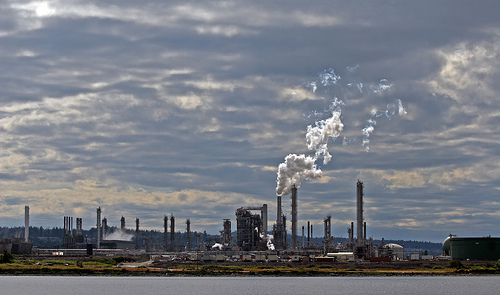Editor’s note: Later posts in this series revise the loophole’s size to $59 million, according to newly available 2014 data from the WA OFM. The $63 million noted below is based on earlier calculations.
The funeral bells are tolling for Tim Eyman’s oil industry-funded and unconstitutional drive to have a small minority of legislators set tax policy. So what better time to take a quick look at one of the strangest tax loopholes on the books in Washington: the “Extracted Fuel Exemption.”
In a nutshell, the “Extracted Fuel Exemption” is an accidental tax loophole that hands oil refineries $63 million each biennium, which works out to about seven percent of the state’s current $900 million budget shortfall. (For a primer on how the loophole works and what it refers to, see here.)
It’s more than passing strange that the loophole mainly benefits refineries because it was created in 1949 before the state actually had any oil refineries—and it was never intended to benefit them. The exemption was, in fact, probably intended for the state’s timber industry, which used wood scraps for fuel at sawmills. But it was so poorly worded that the state’s five oil refineries now claim 98 percent of the benefit. Only one other state, Alabama, has a similar tax exemption on the books and even it is more narrowly tailored for petroleum products.
Even the state’s bipartisan tax review committee is baffled by the loophole. They concluded, in part, “Because the public policy objective is unclear, it is difficult to determine whether the preference is achieving any intended objective.”
With the state trying to reduce both budget shortfalls and carbon emissions, a $63 million handout to the oil industry doesn’t make sense. Former Governor Gregoire proposed closing the loophole in her outgoing budget. Now it’s up to Governor Inslee and the newly unfettered legislator to tighten up a pointless tax loophole and put the money to good use.
More resources on the extracted fuel exemption here:
- SIGHTLINE FACT SHEET: Washington’s Extracted Fuel Tax Loophole
- Sightline’s full-length analysis
- The Joint Legislative Audit and Review Committee (JLARC) assessment
- Office of Financial Management “Tax Exemption Fact Sheets“
- The Department of Revenue summary
- The RCW

